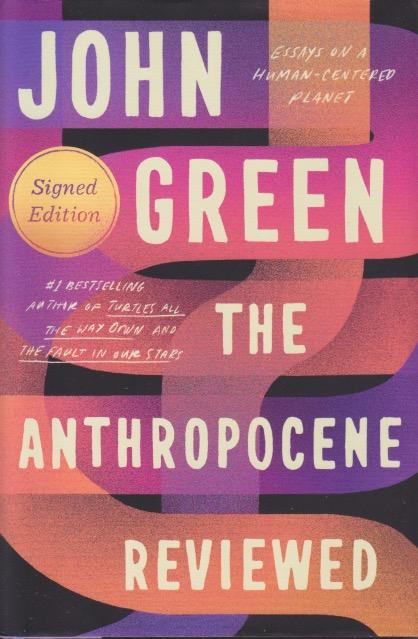
Goodreads Choice Awards elected John Green’s The Anthropocene Reviewed as the Best Nonfiction for 2021. It’s easy to see why. Green has long been known both as an internet personality and as a fiction author. His fiction tends to fall into the Young Adult category, but I’ve read a couple of them as an adult and found them compelling. Green has an uncompromising way of writing about difficult topics and evoking what it was like to be young. His main fan base is probably much younger than me, but I always enjoyed his fiction, so why not non? To understand the context of The Anthropocene Reviewed, it’s important to realize that it is a podcast. Some of the segments have been written up into a five-star rating system that has been done with quite a bit of humor and some very real tears. That’s the book version.
For me personally, reading this book was quite a bit like walking the mental paths already in my own mind. Although we’ve led very different lives, John Green and I share many of the same anxieties, the same love of writing, and similar theological backgrounds. I don’t know him, of course, but I get the sense that we both still wonder what we want to be when we grow up. The selection of topics in this book represent Green’s interests well. Topics are researched and fascinating stories emerge. It takes quite an author to make me keep reading when sports are invoked. Some of the topics are sentimental and some of those must be so. In fact, some of the topics he addresses are things I’ve blogged about. Some of them even use similar phrases to describe our experiences.
The book is subtitled Essays on a Human-Centered Planet. From Green’s point of view, this human-centricity isn’t always a good thing. He nevertheless never loses sight of the fact that humans are fascinating creatures. Fascinating and disturbing. We destroy our own environment and each other. Yet we’re capable of such incredible feats and loving and caring. Green wrestles with his own neurodiversity here. He doesn’t shy away from the difficulties that mental illness can present. He’s also an example of one of us who succeeds despite this liability. Indeed, our neurodiversity is one of those unacknowledged things that make us so very human. We expect a world to obey the laws of logic, which it stalwartly refuses to do. When we notice this we can either cry fowl or we can think about it and invite others to do so. Read this book and think.
